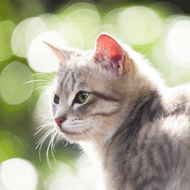Charity reiterates call to regulate cat breeding

There are thought to be between 40,000 and 80,000 puppies and kittens sold via commercial third-party sellers in the UK every year.
Cats Protection has reiterated its call to the government to consider regulating cat breeding so that potential buyers are able to go to a licensed cat breeder.
It comes after the Welsh Government recently announced a consultation considering how best to address issues related to cat breeding and selling.
The charity would like to see an update to the law on selling cats to reflect the modern age, in recognition that most kittens or cats are now advertised for sale online. As part of this, it is calling for a ban on the commercial sale of kittens under eight weeks, which could prevent kittens from being sold at such a young age.
Madison Rogers, advocacy and government relations officers said: “Our branches across Wales still regularly tell us harrowing stories of kittens bred and sold that are very sick. “It’s vital that breeding of cats is regulated and the law on selling cats is regulated to avoid such tragedies.”
There are thought to be between 40,000 and 80,000 puppies and kittens sold via commercial third-party sellers in the UK every year. There are concerns that commercial third-party sales of kittens have the potential to lead to poor welfare conditions, compared to when people buy directly from the breeder.
The Welsh consultation on banning third-party sales, which runs until 17 May, will gather information on the supply chain of puppies and kittens and help identify where Government intervention will have the greatest impact.
Environment minister Lesley Griffiths said: “Ensuring high standards of animal welfare is a priority for the Welsh Government. There is clear evidence that the sale of puppies and kittens via third parties has the potential to contribute to an increased risk of disease and a lack of socialisation and habituation for the puppies and kittens compared to when people buy directly from the breeder.
“The vast majority of those buying a new puppy or kitten do so with the best of intentions. However, it is not always immediately apparent to the buyer where their new pet originated, or in what conditions it was raised. This consultation is an opportunity to gather as much information as possible to enable us to make lasting improvements to the welfare of puppies and kittens bred in Wales.
“Banning commercial third-party sales of puppies and kittens may only be one aspect of this. I urge anyone with an interest in animal welfare to get involved and share their views with us on how we can improve the conditions of sale and ensure good welfare practices.”



 The latest
The latest